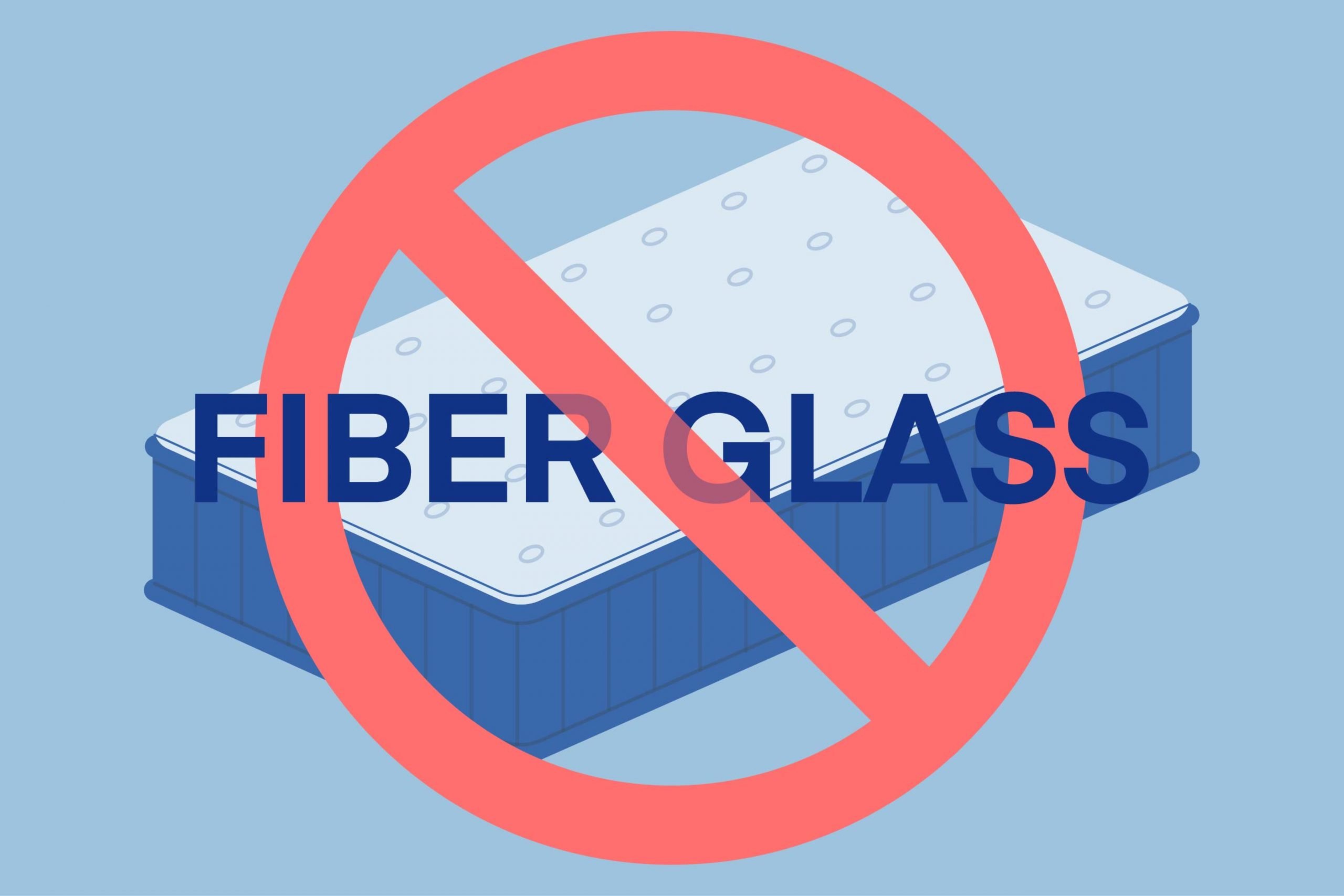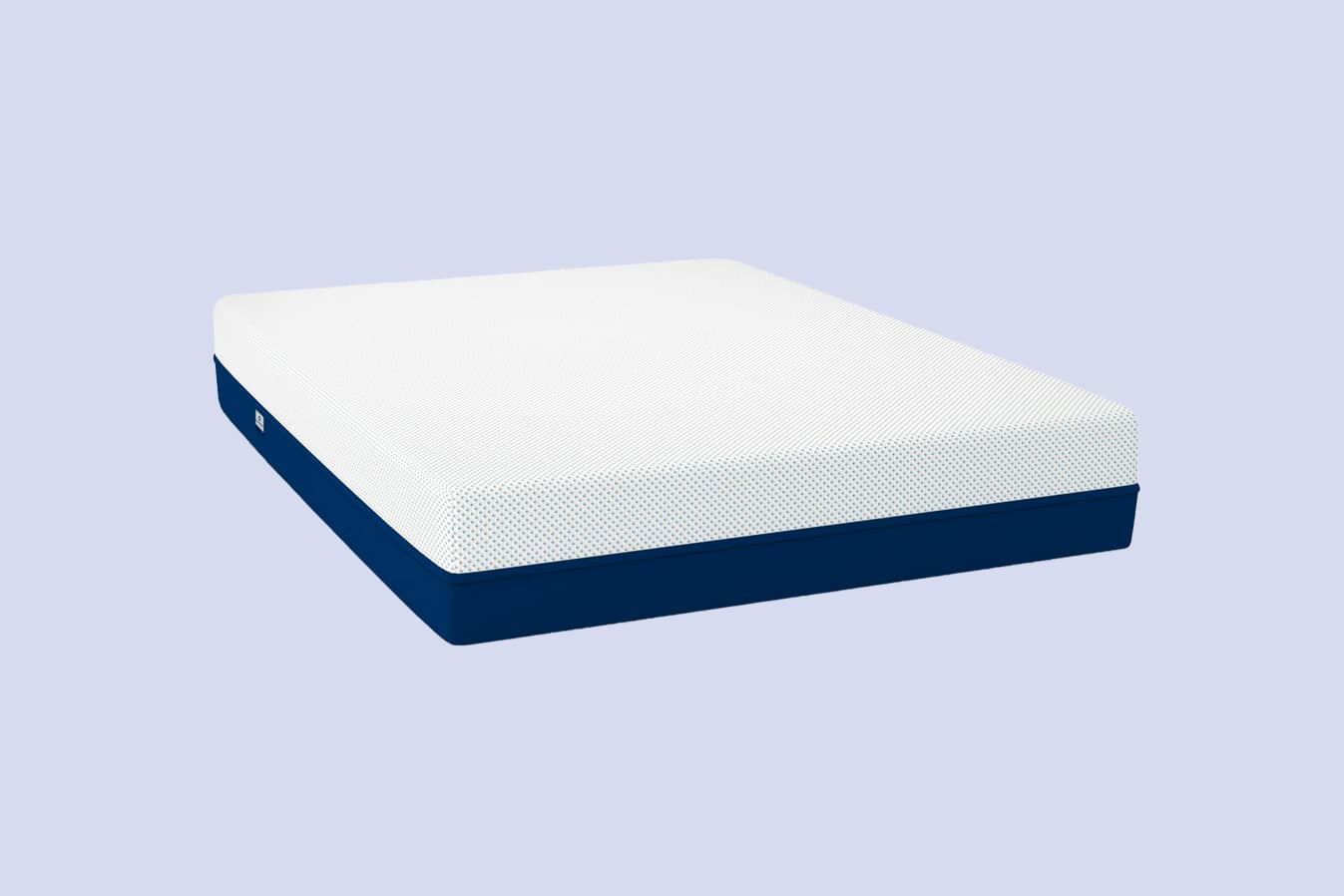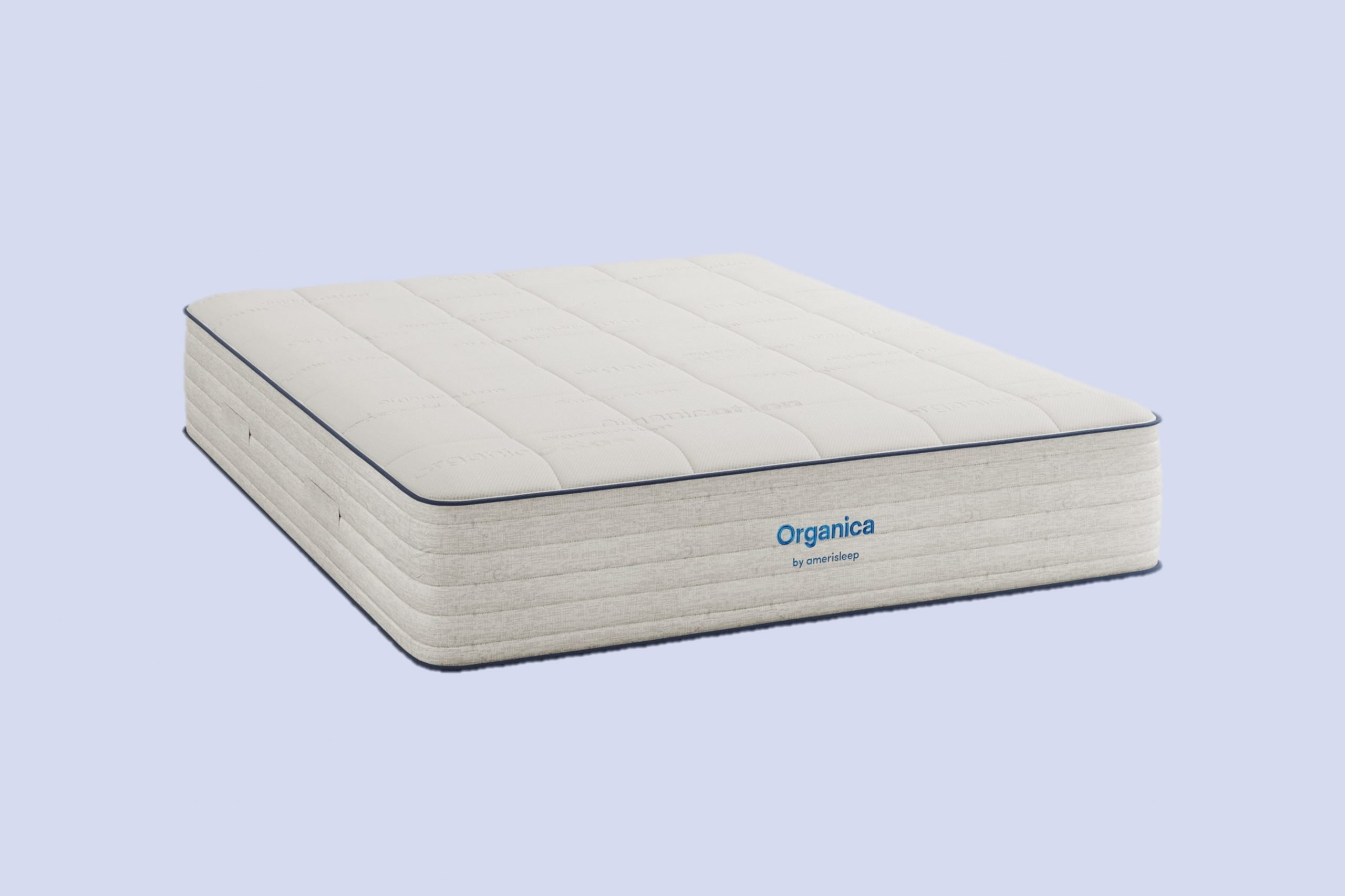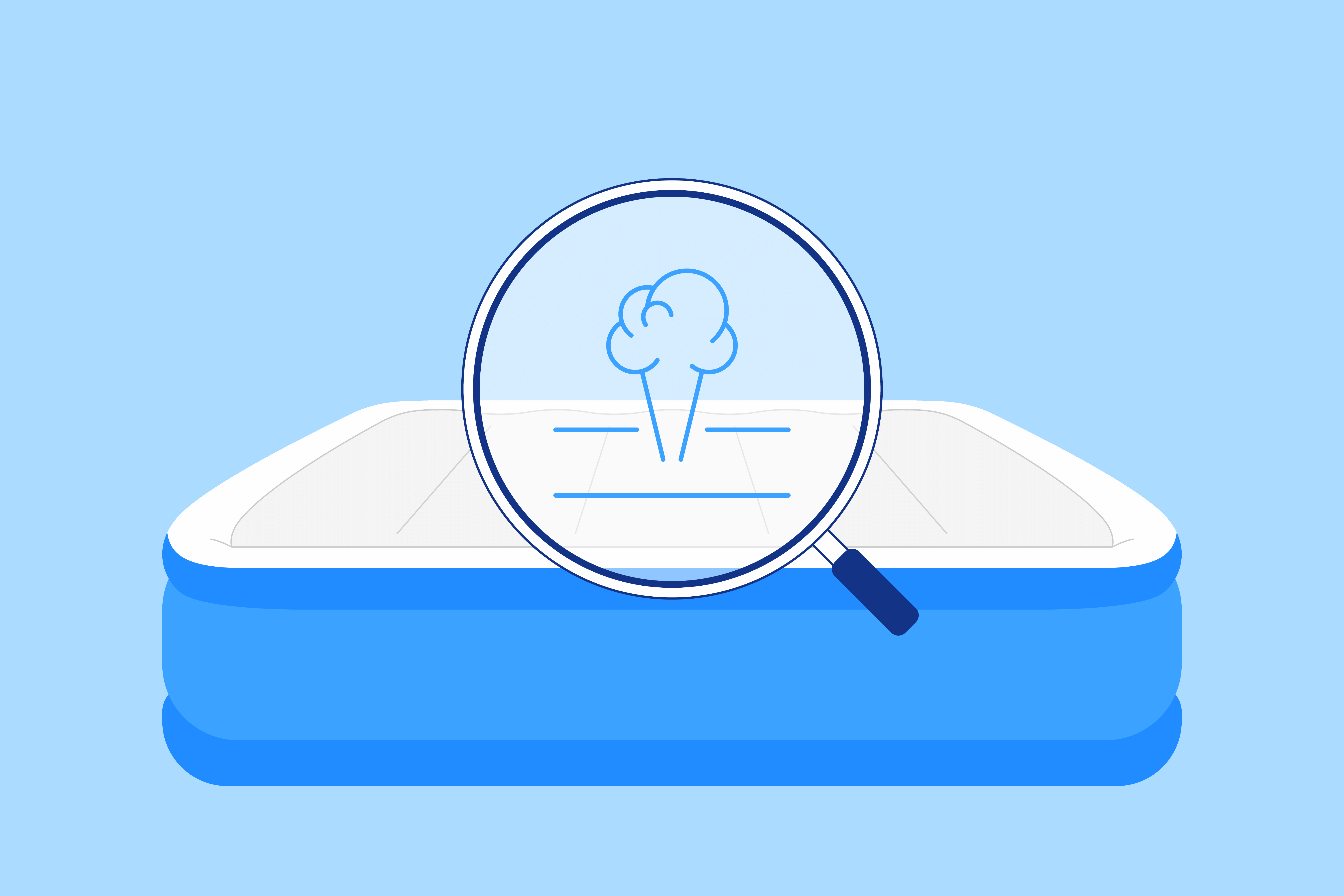Powered by Amerisleep, EarlyBird brings together a dedicated team of sleep science coaches, engineers, and product evaluators. We meticulously examine Amerisleep's family of products using our unique product methodology in Amerisleep's state-of-the-art laboratory. Our commitment to sustainability is reflected in our use of eco-friendly foam in our products. Each article we publish is accurate, supported by credible sources, and regularly updated to incorporate the latest scientific literature and expert insights. Trust our top mattress selections, for your personal sleep needs.
Fiberglass is used in many home-related applications, such as inside insulation or with rooftop shingles. The material is also a common feature inside mattresses, creating a fire-resistant barrier to meet safety standards.
While fiberglass is meant to increase a mattress’s safety, some sleepers are concerned about what can happen if the fiberglass inside the mattress gets loose. A person exposed to fiberglass may develop temporary skin irritation, breathing problems, or a skin infection. Once it’s free of the mattress, fiberglass can spread across the bedroom, creating a mess that’s hard to clean up.
To better address shoppers’ concerns, we want to discuss fiberglass in detail. Why it’s used and what alternatives to fiberglass exist. We also give our recommendation for the best mattress without fiberglass.
“I always ask my patients about their sleep hygiene and sleeping positions as it can contribute greatly to any issues and pain they might be experiencing,” says Jennifer Miller. “They have enough to worry about without having to determine if fiberglass is in their mattress, and I would absolutely point them to Amerisleep to educate themselves on what’s best and safest for them.”
Best Amerisleep Mattress Without Fiberglass
Quick Guide: A 30-Second Summary
| Best Memory Foam Mattress Without Fiberglass | Amerisleep AS3 |
| Best Latex Mattress Without Fiberglass | Amerisleep Organica |
All of our best mattresses without fiberglass ship free and come with a 100-night sleep trial and a 20-year warranty.
-
Price Range
$849 to $1798
-
Mattress Type
Memory Foam
-
Firmness
5 to 6 out of 10 (Medium)
-
Availability
All sizes
-
Warranty
20 Years
-
Thickness
12 Inches
The AS3 is our most versatile mattress model and is completely free of fiberglass. The surface also features a responsive cushion from eco-conscious memory foam, supported by two underlying foam layers.
- Unique memory foam stays cool and adapts swiftly
- Middle features targeted support and pressure relief
- Final foam layer focuses on sag-free spine support
- Sleepers shopping for a fiberglass-free mattress
- Shoppers seeking a cooling memory foam mattress
- Side, back, and combination sleepers
The AS3 is our top-selling memory foam mattress, with more to its name than just a fiberglass-free fire barrier. With a medium feel cushion that suits most sleepers, eco-friendly memory foam, and highly affordable prices, the AS3 is one of the best mattresses on the market.
The first layer of the AS3 is our exclusive Bio-Pur® memory foam. This foam is partly plant-based, made with a mix of traditional ingredients and plant-derived oils, ensures the mattress surface is breathable and responsive. Bio-Pur® forms the comfort layer of most Amerisleep mattresses.
The middle layer of the AS3 is Affinity foam with HIVE® technology. Affinity foam is engineered to add buoyancy to the surface, keeping sleepers from sinking too far and bottoming out on the base foam.
The HIVE® technology inside the second establishes five distinct support zones for the head, shoulders, back, hips, and feet through a simple method. By cutting hexagons into the top of the Affinity foam, and varying up how these cutouts are arranged by support zones, the mattress flexes differently under each part of the body. This establishes a “softer” feel in the shoulders and hips, while the other areas feel “firmer.”
“The soft feel around the shoulders and hips is especially important in my neuro and pelvic health patient population, as many of them have weakness or pain in those areas which can increase without the proper support,” says Jennifer Miller. “Some of their impairments might make it challenging for them to reposition at night, which increases the importance of proper support. Improper support might also cause skin irritation, which would be compounded by contact with fiberglass.”
The third layer of the AS3 is Bio-Core® foam. This structural foam is highly sag-resistant and keeps the spine from shifting out of alignment.
All polyurethane foams inside an Amerisleep mattress are certified safe by CertiPUR-US®. This independent organization analyzes such foams to ensure they are produced without certain harmful materials.
The classic AS3 model is also available as a hybrid mattress, with the AS3 Hybrid relying on a core of pocketed coils. These individually wrapped coils not only isolate movement, making it an excellent mattress for couples, but also feature resilient edge support along the sides.
The AS3 comes with free shipping, a 100-night sleep trial, and an industry-leading 20-year warranty.
Quick Summary
- Plant-based memory foam establishes near-universal comfort
- Five zones of targeted support for parts of the body
- Supportive base foam stands strong after years of daily use
-
Price Range
$1199 to $2698
-
Mattress Type
Latex Hybrid
-
Firmness
5 to 6 out of 10 (Medium)
-
Availability
All sizes
-
Warranty
20 Years
-
Thickness
13 Inches
The Amerisleep Organica is not only free of fiberglass but also constructed with other certified natural materials, such as an organic cotton cover. The wool layer provides fire protection while also wicking away heat and moisture.
- Temperature-regulating cotton fabric cover and wool fire barrier
- Latex foam eases pressure points across the body
- Motion-isolating wrapped coils for extra reactivity
- Shoppers seeking a latex mattress without fiberglass
- People allergic or sensitive to synthetic materials
- Side, back, and combo sleepers
- Hot sleepers
We strive always to offer eco-friendly mattresses, but our Organica mattress is easily our most natural option. With a mix of natural components that establish a buoyant medium feel, this latex hybrid is not only excellent for most sleeping styles but also enables hot sleepers to stay cool and helps allergy sufferers wake without any morning symptoms.
Four layers comprise the Amerisleep Organica. The first layer is our fiberglass substitute, an inch of New Zealand Joma Wool®. This wool helps the mattress resist an open flame, yes, but it provides other benefits too. Wool helps the bed maintain a comfortable surface temperature and can also cushion sensitive areas of the body.
The main comfort layer is 3 inches of Talalay latex, a conforming yet buoyant material that eases pressure points across the body. The latex inside the Organica experiences little to no off-gassing, so there’s no need to worry about being bothered by that “new mattress smell.” The responsiveness of the latex also serves to minimize unwanted sinkage.
The mattress’s support core is 8 inches of pocketed coils. We wrap every coil inside the Organica to increase its motion isolation capabilities. That means if you share the bed with a partner, you won’t disturb their rest if you move out of bed during the night. A coil support core also encourages airflow through the base of the mattress.
The last layer is a foam base of Dunlop latex. This inch-thick base provides structural support and gives the coils a sturdy surface to bounce off from, preventing premature sagging.
Surrounding the mattress’s layers is an organic cotton fabric cover, ensuring soft, cool comfort. The cotton fibers wick away heat and moisture from the sleeper’s body, preventing sleep disruptions. The fact that the cotton is organic also means it has a reduced carbon footprint compared to non-organic cotton.
The Amerisleep Organica has a number of certifications backing it, attesting to its material quality:
- Global Organic Textile Standard (GOTS) has certified the fibers inside the cotton fabric as organic.
- The wool and latex foam has passed the OEKO-TEX® Standard 100 test, which looks for harmful substances.
- The latex foam has also met with the approval of Rainforest Alliance and eco-INSTITUT.
Like all Amerisleep mattresses, the Organica is backed by a 100-night sleep trial and a 20-year warranty. The sleep trial starts when the mattress arrives at your home, giving you a few months to try the Organica out and make sure that it’s right for you. The 20-year warranty helps to protect your purchase against potential defects.
Quick Summary
- Wool acts as a fire barrier while doubling as a cooling cushion
- Talalay latex molds to the body’s sensitive areas, minimizing pressure build-up
- Buoyant coils adapt to movements, with firm sides for edge support
What is Fiberglass?
Fiberglass is tiny particles of glass, as the name implies. The material is also known as:
- Fibrous glass Verified Source Centers for Disease Control and Prevention (CDC) The United States’ health protection agency that defends against dangers to health and safety. View source
- Glass wool
- Glass fibers
- Synthetic vitreous fibers
- Glass-reinforced plastic
These glass particles are used by numerous industries for different purposes, such as housing insulation or weatherproofing. In mattresses, they are used as a flame retardant.
People who work with fiberglass are usually the most at-risk for fiberglass dermatitis, Verified Source National Library of Medicine (NIH) World’s largest medical library, making biomedical data and information more accessible. View source the skin irritation caused by fiberglass exposure. However, it’s also possible for the average person to be exposed to fiberglass through common household items. Aside from mattresses, you can also find fiberglass particles in:
- Liners used in air duct systems
- Home insulation
- Windows and door jambs
- Bathtubs
- Upholstery
Can Fiberglass be Dangerous?
Fiberglass can cause irritation and become embedded in the skin when it’s loose. The appearance of a rash caused by fiberglass depends on:
- The size of the pieces
- How deep they penetrate
- Other environmental factors
Inhaling fiberglass dust can also irritate the nose, throat, or stomach.
Do you notice fiberglass in your skin? You can wash your skin under running water. Gently pat the affected area dry. Then, take a piece of tape and run it over your skin to catch the fibers, peeling the tape off.
What if you’ve taken steps to wash off or remove fiberglass and you still display symptoms of fiberglass exposure? Then it’s likely time to speak with your doctor.
Why is Fiberglass in Mattresses?
If some shoppers find fiberglass undesirable, why is it used in mattresses? Well, the answer has to do with safety concerns surrounding a mattress’s flammability. When a mattress is too quick to go up in flames, it leaves sleepers with little opportunity to save themselves.
In the United States, all mattresses must meet pass/fail criteria for flammability by resisting an ignition source. A 2020 review noted that mattress flammability standards saved an estimated 65 people from bed fires from 2015 to 2016.
Before mattress flammability standards were enforced, mattresses and bedding such as pillows were often the first items to catch fire, according to data accumulated from Verified Source Wiley Multinational publishing company specializing in academic and instructional materials. View source 11,500 residential fires from 2002 to 2005.
Before fiberglass was the common choice of fire barrier, mattresses typically relied on chemical fire retardants. However, these chemical flame retardants were found unsafe for sleeping. So manufacturers switched to chemical-free fire barriers for mattress flame retardants.
Fiberglass is often used because it is inexpensive and relatively safe when kept contained within the mattress. Should your mattress catch fire, the fiberglass inside would melt inside of burn up. This creates a flame barrier.
Manufacturers who use fiberglass in their mattresses often tell consumers not to remove the fabric cover. This can confuse owners if their mattress cover has a zipper.
A reputable mattress company will be transparent about what they use as a fire barrier in their beds. Be cautious, though. Some unscrupulous manufacturers may get away with leaving fiberglass off the material label by out-sourcing the flame retardant firesock from another company, wrapping it around their mattress materials during assembly.
Reading customer reviews before buying a bed can also help you understand if any mattress owners have had issues with fiberglass “leaking” through the mattress you’re considering.
What to Do With Loose Fiberglass?
A mattress with fiberglass can still be a high-quality bed. Many sleepers use a mattress with a fiberglass fire barrier for years without any ill effects. The key thing to understand about fiberglass’s safety is that it is dependant on the material staying within the mattress.
Fiberglass particles can escape over time if the mattress is poorly constructed. For example, as a lower-quality mattress breaks down, it may release fiberglass particles through the cover fabric. It’s also possible to release the fiberglass particles if you remove the mattress cover to clean it.
If you detect signs of loose fiberglass in your home, what can you do? Calling a professional cleaning service specializing in removing fiberglass particles may be the best way to ensure your home is thoroughly cleaned at minimal risk to yourself.
Individuals can also try to clean fiberglass up themselves after taking the proper precautions. But first, they need to wear protective clothing for full-body coverage, including:
- Long-sleeved shirts and pants
- Gloves
- Shoes
- A dust mask
- A respirator
- Workman’s goggles
Next, they need to remove all their furniture and items from the affected area. Naturally, this means finding a place to keep your stuff while you’re cleaning. You may need to rent a storage space for this process.
Do you have items that show signs of fiberglass contamination that cannot be cleaned? Then they must be thrown out. Otherwise, you risk reintroducing the fibers into your home after you’ve cleaned it up.
Fiberglass cannot simply be sucked up with a conventional vacuum cleaner or swept up with a broom. You can’t even rely on the power of a standard air purifier. Instead, you will need a specialty vacuum with a HEPA or ULPA filter.
How Do You Tell if a Mattress Has Fiberglass?
When it comes to identifying potential signs of fiberglass in mattresses, there are several factors to consider. We strongly suggest rejecting mattresses containing fiberglass. Instead, seek out high-quality options that are free of fiberglass and other harmful chemicals. Look for certifications that can verify the bed as a non-toxic and chemical-free mattress.
Made in China Label
Firstly, the origin of the mattress can be an important clue. Many businesses, including mattress manufacturers, take advantage of the low cost of production in China. However, the more relaxed regulations in such countries can result in compromised safety standards, potentially leading to health hazards.
It is therefore crucial to check if a mattress is made in the USA or another country with stricter safety regulations.
Cheap Memory Foam Mattresses
Another indicator of fiberglass presence is the use of cheap memory foam orpolyfoam in mattress construction. While genuine memory foam mattresses tend to be expensive, some manufacturers opt for polyfoam as a cheaper alternative. Unfortunately, polyfoam may contain fiberglass and other inexpensive components, even though these mattresses are marketed as memory foam alternatives.
Price can also serve as a warning sign. Mattresses priced at $400 or less, particularly in larger sizes, are likely to be filled with fiberglass. In an attempt to cut costs, manufacturers may incorporate potentially hazardous materials or employ other cost-cutting measures. However, it is possible to find a fiberglass-free and eco-friendly mattress without exceeding your budget with a bit of research.
Do Not Remove Cover Tag
Labels cautioning against removing the mattress cover can also indicate the presence of fiberglass when reading the mattress tags. Although not all mattresses with non-removable covers contain fiberglass, it is common enough to warrant caution when you’re told not to take off mattress covers. Manufacturers discourage uncovering the mattress to prevent the fiberglass from being exposed.
Greenwashing Terms
It is important to be aware of “greenwashing” terminology, which refers to deceptive marketing practices that make a mattress appear more natural and non-toxic than it actually is. Given the increasing demand for eco-friendly mattresses, some unscrupulous retailers may take advantage of this trend. They may use terms like “glass wool,” “glass-reinforced plastic,” and “glass fibers” to mislead customers.
Low Prices
Every shopper wants to think they’re getting an incredible mattress deal at a low price. However, when it comes to buying a mattress at an affordable price, it’s important to be careful.
You might come across mattresses that have very low prices, like around $100 to $500 for a regular-sized mattress. But it’s more likely that these inexpensive mattresses contain fiberglass. The reason behind their low price might be cost-cutting measures that compromise the quality of the mattress and could even include materials that are potentially harmful.
Now, just because a mattress is affordable doesn’t necessarily mean it’s of poor quality. But it’s always a good idea to be cautious when you see deals that seem too good to be true. It’s important to learn from our past experiences and be aware of the potential risks of a surprise fiberglass mattress.
While there are safe and budget-friendly mattresses available, it’s crucial to have a clear understanding of what you’re actually purchasing. Doing your homework and remaining skeptical can help you stay clear of an undesirable mattress.
Read Customer Reviews
When you’re doing your research on mattresses, it’s a good idea to check out what other customers have to say. Reading customer reviews and looking at third-party websites can give you helpful information on a mattress brand and its offerings. These online reviews can tell you if a particular mattress contains fiberglass or not.
You might want to specifically look at reviews for mattresses sold on popular websites like Amazon, Walmart, Home Depot, and Wayfair, as they have been known to have mattresses with fiberglass in the past.
It’s important to keep in mind that mattress manufacturers might have made changes over time. They could have switched from using fiberglass to other materials. So, when you’re reading reviews, consider how recent they are and whether they accurately reflect the current design of the mattress. This way, you can make a more informed decision based on up-to-date information.
Rest Secure with a Sleep Trial
In case you find yourself in the unfortunate situation of buying a mattress that contains fiberglass, there is still a solution. If you purchased a mattress with a sleep trial, you have the opportunity to return it. Sleep trials are periods of time, usually spanning several months, during which you can try out the mattress and determine if it meets your comfort requirements.
This is especially helpful when buying a mattress online without being able to test it beforehand. Having a mattress with a sleep trial not only allows you to test its comfort, but it can also serve as a safeguard if you discover that the mattress contains fiberglass. This way, you have the option to return the mattress and find a safer and more suitable alternative for a good night’s sleep.
Key Takeaways
- Risks of Fiberglass: Fiberglass in mattresses is a serious concern that can lead to health hazards, so it’s essential to carefully examine the origin and construction of the mattress, avoiding those with low price points and suspicious labeling instructions to minimize the risk of exposure.
- What to Watch Out for: Beware of mattresses made in countries with relaxed safety regulations, as well as those marketed as memory foam alternatives with unusually low prices, as they may contain fiberglass or other harmful materials hidden beneath misleading marketing terms.
- Choosing the Right Mattress: When purchasing a mattress, consider reading customer reviews to gauge the experiences of other buyers and opt for mattresses with a sleep trial to ensure you have the option to return the product if it contains fiberglass or fails to meet your comfort needs.
Replacing a Fiberglass Mattress
If you have a mattress that contains fiberglass and you can’t return it, it’s generally a good idea to replace the mattress. However, if you need time to save up for a new mattress or find the right one, there are steps you can take to protect yourself in the meantime.
We suggest covering your mattress with a tightly woven, waterproof mattress protector. This will not only keep allergens and liquids out but also help contain any loose fiberglass.
Cleaning Up Mattress Fiberglass
To determine if there is loose fiberglass from your mattress, inspect the mattress cover regularly for any openings or worn-out spots where the fiberglass might be escaping. If you can see the fiberglass underneath the cover, that’s likely where it’s coming from. It’s important to address this issue because simply cleaning the fibers without fixing the spot will not stop them from coming out.
Another method is the flashlight test. To perform this test, turn off the lights in the room and close any curtains or blinds to make it as dark as possible. Then, take a flashlight or a strong light source and position it parallel to the mattress surface, pointing directly at the mattress.
Slowly move the flashlight across the mattress, paying close attention to areas where you suspect fiberglass particles may have escaped. Fiberglass particles are small and can reflect light, appearing as tiny sparkling or glimmering specks on the mattress or around the bedroom. Focus on any areas where you see these reflective particles.
Repeat this process, examining different sections of the mattress, including the seams, tufting, or areas where the cover may have small holes or tears. If you’re concerned that the fiberglass has spread around the room, wave the flashlight around to check for any reflective particles.
Once you have a new mattress ready, you can consider how to dispose of the old mattress. We recommend exploring waste management or mattress recycling programs for proper disposal. By replacing your fiberglass mattress and taking necessary precautions, you can ensure a safer and more comfortable sleep environment.
Fiberglass Alternatives
When you’re ready to embrace the world of exciting alternatives to fiberglass mattresses, you may wonder what there is to sleep on. Well, there’s a whole universe of materials waiting to revolutionize your sleeping experience. Let’s dive into some of these fantastic options!
First up, we have wool, the standard when it comes to natural flame-resistant materials. You’ll often find it in organic latex mattresses, but it can work wonders in any type of mattress.
What makes wool so cool, literally and figuratively speaking? Well, it has this incredible power to hold moisture. And this moisture isn’t just for show! It actually helps slow down the ignition process. When wool catches fire, it doesn’t go up in flames like a firework. Instead, it smolders slowly, buying you valuable time to get to safety. That’s why we love using organic wool in our latex Organica mattress.
But wait, there’s more! Wool isn’t the only star in this show, afterall. There are other natural wonders like thistle and flame-resistant plant fibers that can act as impressive flame barriers too. And if you want a mattress that keeps you cool while warding off fire, look no further than those infused with silica or graphite minerals.
But hey, let’s not forget about the synthetic side of things! Polyester and rayon can also limit the spread of fire without relying on fiberglass. And then there’s Kevlar, the mighty plastic. Did you know Kevlar can also safeguard your mattress against fire? This super-strong plastic is designed to withstand intense heat without melting. It’s like having an indestructible shield for your mattress!
Mattress Types
Theoretically, fiberglass can be inside any of the standard types of mattresses—memory foam, latex, innerspring, and hybrids. However, you are more likely to find it inside some types of mattresses than others.
Memory Foam
 Memory foam mattresses are a conforming option, excellent for relieving pressure and preventing morning aches and pains. Their production is also relatively inexpensive, and memory foam mattresses are available at all price points. There are also quite a few variations on the traditional formula, such as plant-based memory foam and gel memory foam.
Memory foam mattresses are a conforming option, excellent for relieving pressure and preventing morning aches and pains. Their production is also relatively inexpensive, and memory foam mattresses are available at all price points. There are also quite a few variations on the traditional formula, such as plant-based memory foam and gel memory foam.
Memory foam was part of the reason mattresses in a box grew to be so successful. The material was so conforming that it could be easily compressed and rolled up inside a relatively small box, allowing mattress companies to offer convenient home delivery across the country. Other mattress types are also packaged as a bed in a box, but memory foam beds remain a popular choice.
However, many memory foam mattresses do rely on fiberglass for fire protection. That’s not to say it’s impossible to find a memory foam mattress that doesn’t contain fiberglass, only that it can be a difficult task.
Latex Foam



The benefits of a latex mattress extend beyond enjoying a mattress free of fiberglass. Latex foam is a durable material that resists permanent impressions. It’s also one of the most natural mattresses on the market, beneficial for sleepers irritated by synthetic materials.
When it comes to how long a mattress lasts, natural latex mattresses often outlast other mattress options. However, the production cost of natural or organic latex layers can make it difficult for a budget shopper to afford a pure latex bed. Some may find a latex hybrid mattress suits their budget better.
See our latex vs memory foam mattress guide for more information and an in-depth comparison of these two types.
Innerspring



Aside from the potential of a fiberglass fire barrier, traditional innerspring mattresses have also lost some favor with shoppers because they’re not as conforming as other mattress types. People who enjoy a mattress for pressure point relief may prefer another mattress type, rather than an innerspring mattress.
Hybrid



By blending different components, hybrid mattresses aim to deliver a comfortable and supportive sleep surface that caters to a wide range of sleep preferences. Whether or not a hybrid mattress has a fiberglass fire barrier can depend on its comfort layer. Memory foam hybrids often include fiberglass, while a hybrid mattress with latex foam layers is more likely to have an alternative fire barrier.
As a side note, a mattress only qualifies as a hybrid mattress if it has 2 to 3 inches of comfort foam, a pocketed coil support core, and a base to structure the coils.
Air Mattresses



Air mattresses are also highly unlikely to have any sneaky fiberglass hiding inside. You see, fiberglass could potentially cause a leak in the mattress, and nobody wants that! The Consumer Product Safety Commission (CPSC) says that air mattresses don’t have to meet flammability standards unless they have upholstery material between the ticking (that’s like the cover) and the mattress core. So, you can rest easy knowing that fiberglass is highly unlikely to be an issue with air mattresses.
Waterbeds



But wait, there are a few other things to consider before diving into a waterbed adventure. For instance, if they spring a leak, you might end up in a watery mess, which can be quite a hassle to deal with. Plus, filling them up with water can take a bit of time and effort.
Mattress Firmness
What does the most comfortable mattress possess? Well, that answer can depend on your sleeping style. Your sleeping style consists of your preferred sleeping position and your body weight, and understanding how they impact the way a bed feels can be the difference between lying on a luxury mattress or a mattress clunker.
How comfortable a mattress feels to you depends primarily on whether its firmness complements your sleeping position. Each sleeping position has its own recommended firmness range.
Side Sleepers
A mattress for side sleeping should have a soft, medium-soft, or medium surface to offer needed pressure relief. Without a sufficiently soft mattress, side sleepers are likely to wake up with sore shoulders and hips.
Back Sleepers
A mattress for back sleeping should provide a medium-firm to firm feel to minimize the sinkage that can cause spinal misalignment.
Stomach Sleepers
A mattress for stomach sleeping should feature a firm surface. The consistent feel helps maintain stomach sleepers’ natural spine alignment.
Combination Sleepers
Do you move between these positions? Then you’re considered a combo sleeper. A mattress for combination sleeping should offer a medium to medium-firm feel for adequate support.
Body Weight
It’s not just your sleeping position that has to be considered. Sleepers also need to shop for the best mattress for their body type to ensure their mattress will offer adequate pressure relief:
- For sleepers under 130 pounds who don’t press down as much as a heavier person, a bed with more conforming cushioning is necessary to wake up free of pain. Otherwise, a firmer mattress can feel like a board to smaller sleepers, due to how little they press down and soften the surface with their bodies. A mattress for petite sleepers should fall in the softer end of their recommended range.
- For sleepers over 230 pounds, their mattress needs to be able to withstand the extra force that their bodies place on the bed. Surfaces also tend to feel more conforming to a plus-size individual, thanks to the pressure they place upon it, so they may not enjoy a softer mattress. A mattress for a heavy person often benefits from falling in the firmer end of their recommended range.
Sleepers between these two weight categories are considered “average,” which means their body weight isn’t a major deciding factor when browsing fiberglass-free mattresses.
What about the body changes that might occur during pregnancy? As the body undergoes changes during pregnancy, especially in the later months, most people tend to sleep on their side. Therefore, it is important to select a mattress that is suitable for this sleeping position and can gently cradle their body and their increasing belly.
To ensure comfort during pregnancy, opt for a mattress that is thick, soft, and supportive. A thicker mattress for pregnancy can help distribute body weight more evenly, minimizing pressure points and promoting proper spinal alignment. Soft mattresses can provide cushioning, particularly in areas like the hips and shoulders that may experience discomfort during pregnancy.
Couples
When it comes to choosing the right queen or king size mattress for couples, finding the perfect balance of firmness and comfort can be an exciting adventure! Let’s dive into some tips that will help you and your partner select the ideal mattress together.
Communication is key! Start by discussing your individual preferences and any specific sleep needs you may have. Remember, everyone is unique, and what feels comfy for one person might not work for the other. Understanding each other’s preferences will guide you toward a mattress for couples that suits both your needs.
Consider a medium mattress option. This firmness level often works well for couples as it provides a blend of support and comfort. It helps to maintain proper spinal alignment while offering enough cushioning for pressure relief. It’s like finding that sweet spot where you both feel cozy and well-supported.
Then, test it out together. Lie down on the mattress together and try different positions. It’s like embarking on a fun date! Feel how the mattress contours to your bodies and supports your weight. It’s a chance to see if it meets both of your comfort requirements and ensures a harmonious sleep experience.
Consider also personalized comfort options. Some split king mattresses let you customize firmness levels on each side of the bed. This way, you can tailor the firmness to your liking individually. It’s like having the best of both worlds, allowing you and your partner to enjoy personalized comfort while sleeping side by side.
While the right mattress firmness is important, don’t forget about temperature regulation. Couples can generate extra warmth when sharing a bed, so a cooling mattress can be a game-changer. Look for materials that promote airflow and heat dissipation, such as advanced memory foam or breathable fabrics.
Plus, keep motion isolation in mind. If one partner tends to move around or get up during the night, look for a motion-isolating mattress. This feature helps minimize the motion transfer, so one person’s movements won’t disturb the other’s precious sleep.
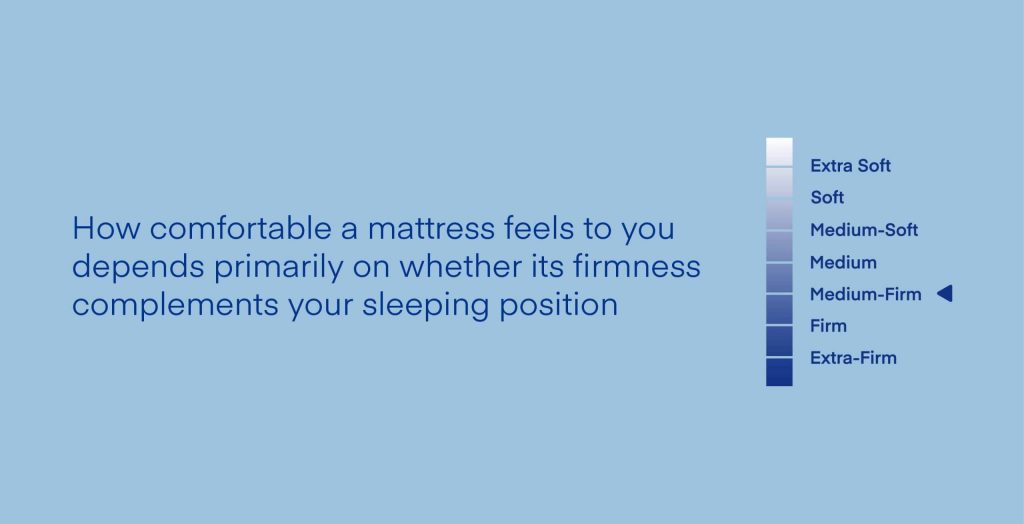


Certifications for Shoppers
You don’t have to just take mattress manufacturers at their word when they say a mattress is safe or free of harmful chemicals. A material certification is essentially a stamp of approval from a third-party organization, and it typically signifies one of three things:
- The material is free of potentially dangerous chemicals and potentially toxic substances
- The material contains minimal VOCs for reduced emissions
- The material meets certain standards for socioecological responsibility
What type of certification you should look for depends on what type of mattress you want. For example, CertiPUR-US® is an agency dedicated to ensuring that memory foam and other forms of polyurethane foam are free of materials such as:
- Ozone depleters
- Mercury, lead, and other heavy metals
- Formaldehyde
- PBDEs, TDCPP, or TCEP retardant chemicals
Our unique memory foam material, Bio-Pur® foam, is CertiPUR-US® certified, as is every other poly-foam we use in our mattresses.
As a side note, CertiPUR-US® certified foam is free of fiberglass, though the agency notes that they only examine the foam itself and not any surrounding materials. So a memory foam bed with the CertiPUR-US® certification may still have fiberglass in the fire sock under the cover.
Global Organic Latex Standard (GOLS) is a helpful certification for sleepers seeking an eco-friendly mattress. GOLS ensures that processed latex foam contains only natural latex and certain other approved materials, perfect for anyone seeking an organic mattress.
Some certifications are fairly universal and can be applied to almost any mattress type. The Global Organic Textile Standard (GOTS) is a worldwide certification verifying organic fibers are processed in a socially and environmentally responsible manner. The OEKO-TEX® has a few certifications, including the Standard 100 certification for textiles that have been tested for harmful substances.
Mattress Sizes
Just as you can find every type of mattress without fiberglass, so too you can find every mattress size without fiberglass. These sizes are largely uniform across different mattress brands, though which sizes they offer can vary mildly. For example, some may not offer a split king size mattress, and a few may not offer a Californa king size mattress.
Twin
A twin mattress without fiberglass is the smallest standard size and typically measures 38 inches wide and 74 inches long. Twin mattresses are commonly used for children’s beds, bunk beds, or in small guest rooms where space is limited.
Twin XL
The twin XL mattress is slightly longer than the regular twin, measuring 38 inches wide and 80 inches long. It provides additional length, making it suitable for taller individuals or college dormitories.
Full
A full size mattress, also known as a double mattress, measures 54 inches wide and 75 inches long. It offers more width than a twin but is still considered a compact option. A full mattress without fiberglass can accommodate a single sleeper comfortably or be used for couples who prefer a smaller sleeping space.
Queen
The queen size mattress is a popular choice for couples and offers more room to stretch out. It measures 60 inches wide and 80 inches long, so a queen mattress without fiberglass provides ample space for two people to sleep comfortably.
King
The king size mattress is the largest standard size and is designed for couples who want plenty of space. It measures 76 inches wide and 80 inches long, offering each person the same width as a twin bed. The extra width makes it ideal for couples who prefer more personal space while sleeping.
California King
The California king mattress, also known as a Western king, is longer but narrower than a regular king-size mattress. It measures 72 inches wide and 84 inches long, making it a suitable choice for taller individuals who need extra legroom.
Split King
A split king mattress consists of two separate twin XL mattresses placed side by side, making up the dimensions of a king size bed. Each side can be adjusted independently, allowing couples to customize their sleeping preferences, such as firmness or inclination, without disturbing their partner’s side.
Mattress Policies
Lastly, when buying a new mattress, it’s important to consider two key protective policies: the warranty and the sleep trial. By choosing a mattress with a warranty, you ensure your investment is protected against any potential defects or issues. And by opting for a sleep trial, you give yourself the chance to thoroughly test and evaluate the mattress, see if offers the comfort and support you need for a good night’s sleep.
Mattress Warranty
A warranty is like having a safety net for your mattress investment. It provides you with protection against manufacturing defects and gives you peace of mind knowing that the manufacturer stands behind their product.
A mattress warranty ensures that if anything goes wrong with your mattress due to faults in materials or workmanship, you have the option to have it repaired or replaced without incurring additional costs. It’s like having a guarantee that your investment is protected and that the manufacturer believes in the quality of their product.
Mattress Sleep Trial
A risk-free sleep trial is like a test drive for your mattress. It allows you to try out the mattress in the comfort of your own home for a specific period, typically ranging from several weeks to a few months. This trial period is crucial because it takes time for your body to adjust to a new mattress and for you to truly determine if it meets your comfort needs.
It’s like having the opportunity to experience the mattress’s performance during various sleep cycles and see how it supports your body and promotes a restful sleep. If, during the sleep trial, you find that the mattress isn’t suitable for you, many companies offer the option to return for a full refund, ensuring that you end up with a mattress that truly suits your preferences.
Which Mattress Brands Use Fiberglass?
| Mattress Brand | Do They Use Fiberglass? |
|---|---|
| Allswell | Yes |
| AmazonBasics | Yes |
| Amerisleep | No |
| Amorebeds | No |
| Ashley Mattresses | Yes |
| Avenco | No |
| Avocado | No |
| Awara | No |
| Bear | No |
| Best Price Mattress | Yes |
| Big Fig | No |
| Birch | No |
| Brentwood Home | No |
| Brooklyn Bedding | No |
| Casper | Yes |
| Classic Brands | Yes |
| Crystli | Yes |
| Dynasty Mattress | No |
| Eco Terra | No |
| Eight Sleep | Yes |
| Emma | Yes |
| Essentia | No |
| Full Moon | Yes |
| GhostBed | Yes |
| Happsy | No |
| Helix | No |
| Joybed | No |
| Keetsa | No |
| Latex for Less | No |
| Layla | Yes |
| Leesa | Yes |
| Linenspa | Yes |
| Lucid | Yes |
| Lull | Yes |
| Mainstays | Yes |
| Maxim | No |
| Minocasa | No |
| Mlily | No |
| Molblly | Yes |
| Molecule | Yes |
| My Green Mattress | No |
| NapQueen | Yes |
| Natural Form | No |
| Naturepedic | No |
| Nectar | Yes |
| Nest Bedding | No |
| Nolah | No |
| Novilla | No |
| Oleesleep | Yes |
| Perfect Cloud | Yes |
| Plushbeds | No |
| Puffy | Yes |
| Purple | No |
| Saatva | No |
| Sealy | Yes |
| Siena | Yes |
| Signature Sleep | Yes |
| Silk & Snow | No |
| Sleep Innovations | Yes |
| Sleep Number | Possibly, but uncertain |
| Sleepy’s by Mattress Firm | Yes |
| Spindle | No |
| Stearns & Foster | Yes |
| Sunrising Bedding | No |
| Sweetnight | No |
| Tempurpedic | Yes |
| Tuft & Needle | No |
| tulo by Mattress Firm | Yes |
| Vaya | No |
| Vibe | Yes |
| WinkBeds | No |
| Zinus | Yes |
| Zoma | No |
Frequently Asked Questions
Does every mattress have fiberglass?
No, not all mattresses rely on fiberglass for fire protection. Instead, modern fiberglass-free mattresses can instead contain fire-resistant wool, plant fires, or a silica sock that prevents oxygen from fanning the flames.
The best type of mattress to consider as you shop for a bed without fiberglass is latex foam. Not all latex mattresses are necessarily free of fiberglass, but many latex bed manufacturers rely on organic wool or another material to meet mattress safety requirements.
Why are mattresses made with fiberglass?
Manufacturers rely on fiberglass when constructing because it’s relatively cheap and helps the bed resist an open flame. When fiberglass grows too hot, it melts instead of catching fire, keeping the mattress’s insides from burning. Having a fire barrier inside a mattress is a crucial part of decreasing fatalities during a house fire.
Fiberglass is also considered a healthier option than the chemical flame retardants previously used to help mattresses resist an ignition source.
What can a mattress have instead of fiberglass?
Common alternatives to a fiberglass fire barrier include wool layers, flame-resistant plant fibers, and silica. If the mattress you’re considering doesn’t list what material it relies on for fire protection, try reaching out to the mattress brand’s customer service team.
As we mentioned earlier, fiberglass was implemented to replace potentially harmful chemical barriers, so you would not want to choose a mattress that relies on chemical flame retardants to meet safety standards.
How do you know if fiberglass has escaped a mattress?
Fiberglass is difficult to see with your eyes, although some pieces are large enough for the casual observer to catch. If you’re concerned about whether or not fiberglass is escaping your mattress, try turning off your bedroom lights and aiming a flashlight’s beam directly on the bed and surrounding area. Fiberglass tends to shine under a bright light.
Symptoms that an individual has been exposed to fiberglass include:
- Skin irritation or pain
- Red or irritated eyes
- Stomach troubles
- Sore throats or sore noses
How do you get rid of fiberglass particles?
Fiberglass particles are too small to be sucked up by a standard vacuum cleaner. Typically, they’re so tiny that they can’t be seen individually by the naked eye, though the accumulated particles can be detected by their white, fluffy appearance. The particles may also have a slight shine, particularly under a bright light. Essentially, the particles may look not unlike glitter.
Do you suspect you have a fiberglass problem? You can contact a professional cleaning company and ask if they offer fiberglass removal. It’s also possible to clean it up yourself with a HEPA or ULPA vacuum cleaner. We suggest wearing protective clothing that fully covers you along with a dust mask, respirator, and googles.
Before cleaning, move all of your possessions out of your home first.
The Bottom Line
Fiberglass isn’t inherently bad when kept contained. However, many sleepers feel more secure when lying on a mattress with a different fire barrier. A natural latex mattress is the type of bed most likely to substitute fiberglass for another material. However, you can also find memory foam, innerspring, and hybrid mattresses that contain fiberglass alternatives.
If you’re unsure whether or not a mattress contains fiberglass, we suggest reaching out to the manufacturer and asking what material it uses as a fire barrier. You can also check whether or not the manufacturer recommends against removing the mattress cover, as this can be a clue that the mattress has fiberglass that should be kept contained.
About the author
April Mayer is a sleep expert and writer with a degree in exercise physiology. She has dedicated her career to exploring the relationship between sleep and productivity. Her insightful articles, such as "The Surprising Way Your Mood Might Be Messing With Your Productivity" and "Wake Up to More Productive Mornings," have been featured in reputable publications like Forbes, Greatist, Real Homes, Thrillist, Tom's Guide, and Eat This, Not That. With a passion for helping others lead more productive lives through restful sleep, April offers valuable expertise on foods and vitamins for better sleep. As a trusted member of the Early Bird team since March 2020, she continues to provide informative and well-researched content.
View all posts